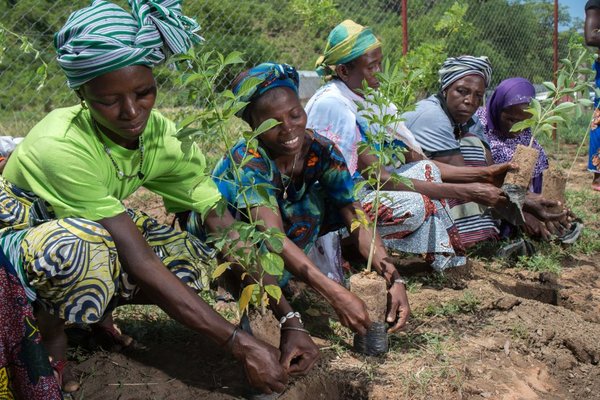- Share this article
- Subscribe to our newsletter
GIZ: Webinar Series on Social and Behaviour Change
In food and nutrition-security areas, social and behaviour change activities are often geared to encouraging mothers to adopt healthier eating habits, practice adequate feeding and adapt their cooking and hygiene practices.
Agriculture and value chain projects focus on smallholder farmers and enterprises, motivating and supporting them to take up practices such as soil protection and rehabilitation measures, use of improved seed varieties and drawing up effective long-term business procedures.
How can we support behaviour change processes effectively?
We know that it is often simply not enough to raise awareness and disseminate knowledge - human behaviour is determined by a range of personal and external factors. A person’s knowledge, skills or self-confidence are often factors as equally important as influence from family members, friends, local-level groups and local leaders, service providers or institutions at community level. In addition, the societal level, including government policies, culture, social norms, media, etc., plays a crucial role.
Therefore, understanding people´s perception and putting people in the centre of our interventions is an important first step. This includes a proper analysis to understand barriers and motivators to change, using insights from behavioural science.
In order to provide an in-depth understanding of the use and benefits of a structured approach to social and behaviour-change activities, the Deutsche Gesellschaft für Internationale Zusammenarbeit (GIZ), on behalf of the German Federal Ministry for Economic Cooperation and Development (BMZ) and in collaboration with the ANH Academy, prepared a series of five webinars to promote social and behaviour change (SBC) for improved agriculture and nutrition.
The kick-off webinar on ‘Social and behaviour change essentials’ took place on 16 July 2020. The speaker, Danielle Chekaraou, shared her expertise from 30 years working experience in the field of social and behaviour change. She highlighted the importance of systems-thinking in order to keep a holistic approach to programme planning for behaviour change.
During the webinar, Ms Chekaraou pointed out that in order to start a successful SBC strategy, people must understand the ‘value’ of change. Hence, the answer to “what’s in it for me?” is crucial. “Value systems may not be the same and you may be able to motivate someone to an action for a reason other than the one you think, and that is okay”, Chekaraou emphasized.
Furthermore, people must be ready for change and they must be involved in the change. Often, people know what they need in order to adopt a certain behaviour, they just require support in implementing it. Finally, she highlighted that people ought to be surrounded by models of change who are excited about the change or the behaviour.
For Danielle Chekaraou, the first step of a successful SBC strategy is to define the desired behaviour. “I often find it interesting that when I begin a training, I ask programme implementers what behaviours they are promoting, and they are incapable of articulating what it is they are actually promoting or wanting people to do” she recounted during the webinar. Thus, programme implementers have to be able to clearly articulate the behaviours they want to see in their programmes. For example, when promoting ‘proper food storage’, a related behaviour would be that ‘farmers store their grain in improved silos immediately upon harvest’.
With the “barrier road”, Chekaraou vividly illustrated the steps programme implementers have to take to arrive at the destination – a positive behaviour. Along the route, it is important to communicate with the target group in order to understand the barriers and provide appropriate enablers. If you are keen to see what else Danielle shared during this webinar, visit the recording at anh-academy.org.
Next Webinar on key barriers and motivators to change on 11 August
The next webinar will be held on Tuesday, 11 August at 3 pm CEST. It will address the barriers and motivators to behaviour change that allow us to understand why some people do practice positive behaviours and others don’t. It will also shed light on how to research the key barriers and motivators to change.
Resources:
Social and Behaviour Change: Insights and Practice; Practitioner’s Guide
Changement social et comportemental: Perspectives et pratiques; Guide du praticien
Registration for the next webinar: “Barriers and motivators to behaviour change”
Authors:
Julia Goette (Sector Project Agricultural Policy and Food Security)
Dr Annette Roth (Sector Project Agricultural Policy and Food Security)
Deutsche Gesellschaft für Internationale Zusammenarbeit (GIZ) GmbH, Bonn, Eschborn, Germany





Add a comment
Be the First to Comment